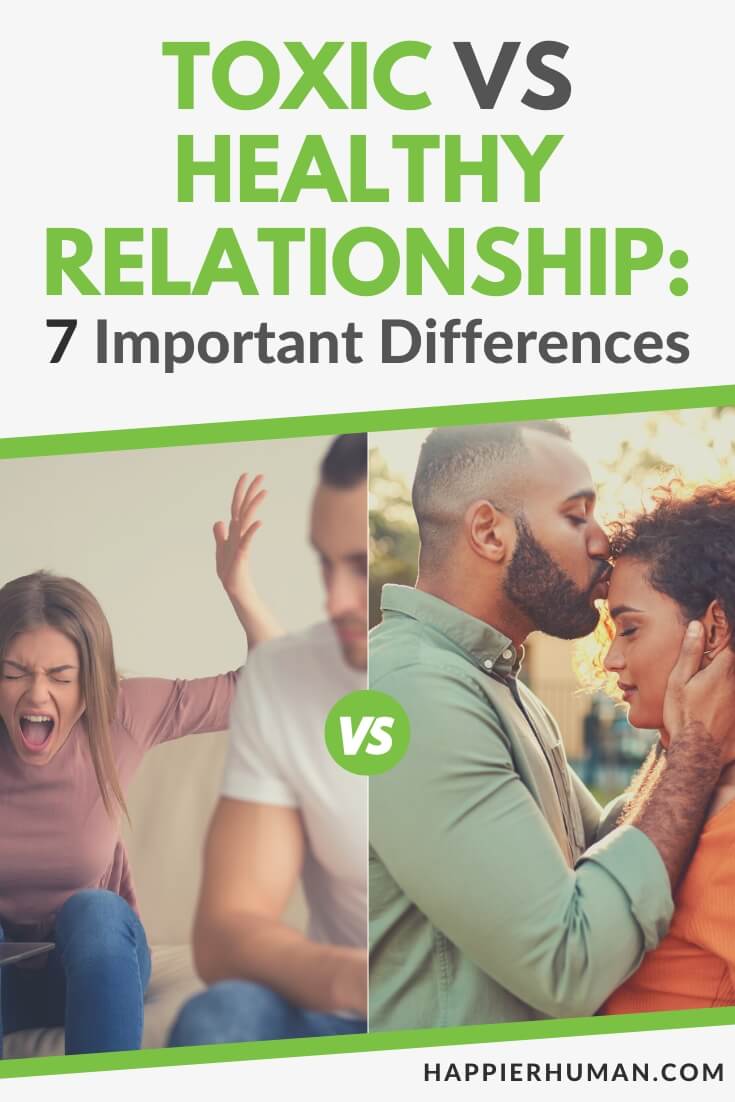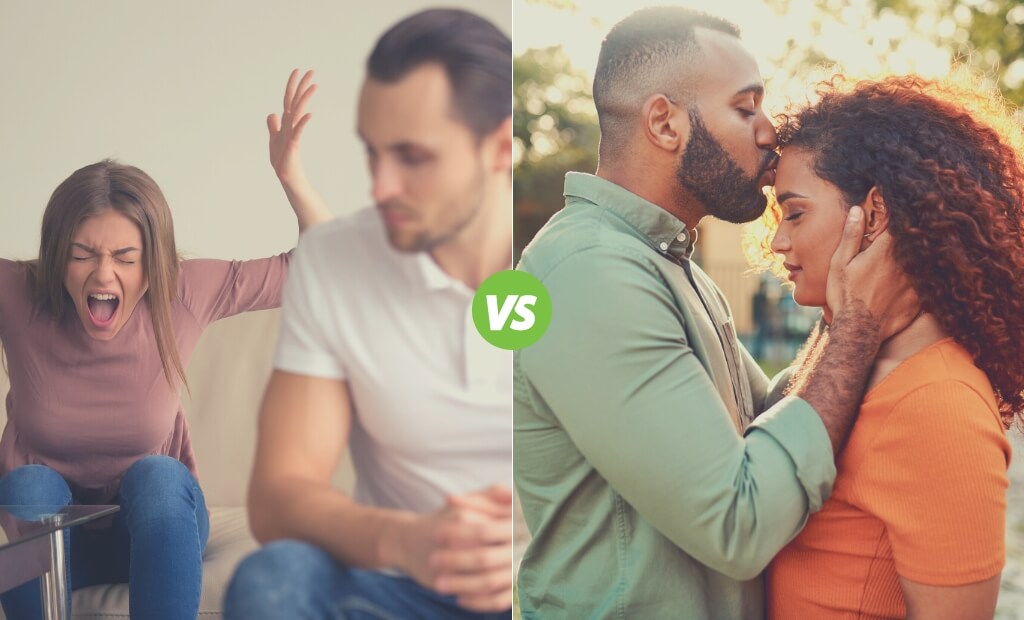There might be affiliate links on this page, which means we get a small commission of anything you buy. As an Amazon Associate we earn from qualifying purchases. Please do your own research before making any online purchase.
We all dream of having a perfect and happy relationship one day. Nobody sets out to end up in a toxic relationship where you suffer pain, rejection, and neglect.
But how do you know when entering a new relationship if you are in a toxic vs healthy relationship? After all, it’s not like bad partners advertise their skills set as “charming partner will destroy you financially and cause you to become emotionally bankrupt.”
Knowing someone is a toxic partner is the first step to getting help and engaging in self-care when you are in a relationship. You can only step away or get your relationship some professional help if you can tell whether your relationship is simply real (as in blissfully imperfect) or toxic.
Here’s what to look for.
What Is a Healthy Relationship?
For me, a healthy relationship is one where you and your partner don’t argue or fight for more than 20% of the time you spend together. In a healthy relationship, it works for at least 80% of the time. You and your partner are supportive, compassionate, caring, and present for each other.
In a healthy relationship, there should be more good than harm. You and your partner are real, and you both work at your relationship challenges, making actual strides to an even better relationship.
What Is a Toxic Relationship?
The polar opposite is a toxic relationship. This is a relationship (and I can’t use the idea of partnership for a toxic relationship since you and the person you are in a relationship with aren’t partners) where you both argue and fight constantly. At least 25% of your time together is spent arguing and being harmful to each other.
In a toxic relationship, the time you spend together is damaging to both of you, and neither party to the relationship feels they get any benefit from being together. Ultimately, the relationship becomes a place of resentment and harm.
How Do You Know Whether Your Relationship Is Healthy or Dysfunctional?
Looking at your relationship today, is it healthy or toxic? Are you in a healing and supportive relationship where you both work on your challenges together, or are you and your partner often running past each other and abusive in how you interact?
Believe it or not, it can be hard to tell whether your relationship is dysfunctional or healthy, especially when you and your partner have been together for a long time. The only way you can do an objective relationship assessment is to step back and keep a journal for a week or two.

Keep track of all the events and how you behave towards each other during that time. Ask yourself whether the actions you record are typical or if something unusual happened to provoke your behavior.
Now look for the following differences and signs whether your relationship is toxic or healthy.
7 Differences: Toxic vs Healthy Relationships
Toxic and healthy relationships often appear as opposites, but these also operate on a sliding scale of severity. A toxic relationship may have moments where it is almost healthy, when things go well, and you and your partner feel happy.
It can also hit the absolute low end of the scale and be a disaster zone. Likewise, a healthy relationship can slide between being utter bliss and being a day in hell.
So, assess your relationship over a period of at least a week or two. We all have bad days, and as long as these aren’t the norm, we can safely assess where we lie on the relationship health scale.
1. Apologies
“I’m sorry.” These small words have such power—when you mean them. How you use them and if you use them will say a lot about your relationship health.
A toxic relationship: When the relationship is unhealthy, one or both parties will refuse to apologize. Hell would freeze over before “I’m sorry” would be said (and meant). Remember that “I’m sorry” isn’t a get out of jail free card. For those in a toxic relationship, apologizing often feels like you “let the other person win,” forgetting that when it’s about who wins, nobody wins.
A healthy relationship: You apologize willingly and with honesty when you have transgressed the code of your relationship. When your partner hurts, you bleed.
You are willing to admit when you are wrong and when you have done something that hurt your partner, and you are willing to do whatever you need to so they can feel better or know comfort.
2. How You Talk About Your Partner
What you say about your partner can say more about you than you know. If your partner is going through a rough patch, they don’t need you to be disloyal and backstab them or run them down.
A toxic relationship: Gossiping about the person you are in a relationship with is a sign your relationship is toxic. You use the opportunity to make them seem small or weak so you can feel bigger and strong. Having an affair and talking out of the bedroom is one such example, but even the unkind words you say about your husband or wife to their family or your friends can be a sign you are toxic and there is resentment in the relationship.
A healthy relationship: Your partner is also your friend. A real friend and loyal partner won’t speak ill behind your back. They will defend your honor when you aren’t there, even if it costs them. You and your partner should have each other’s backs and support each other with words and deeds.
3. Relationship Equality
A relationship should offer safety and happiness to all involved. That starts with equal value and shared importance.
A toxic relationship: One person is always more important than the other, with the other person serving the dominant person. In a toxic relationship, one person’s needs (the servant) are never met.

A healthy relationship: When you and your partner are equally valuable and important in the relationship and you compromise to meet each other’s needs, you are sharing your lives and feel like you both matter. There is happiness in being seen and valued like this.
4. Conflict Resolution
Couples who pray together, stay together—this saying has gotten a bit dated, and I prefer this one: couples who talk it out, live with love and don’t shout, stay together.
A toxic relationship: When you and your relationship partner shout and argue violently with name-calling and abusive language, you are both setting yourselves up for failure. Arguing is not something that is natural in a relationship. Instead, do what a happy and healthy relationship does…
A healthy relationship: While you and your partner may not always agree on everything, you agree on one thing—you value each other enough to talk through your disagreements and not shout or argue. You accept that you don’t have to agree on everything, but you respect each other’s views and opinions. When you discuss things, it’s never about being “right.”
5. Creating a Safe Space to Share
The world can be a pretty hard and unforgiving place where what you say in a moment of weakness can be used against you. We sense that it’s a jungle out there, and our relationship is the place where we should be able to relax and not have to police our words and thoughts all the time.
A toxic relationship: When your significant other talks about what you confide in them, they are betraying your trust. Worst still, they may do so to stir up trouble for you between you and your family or friends. This is usually a sign of a narcissist or someone who gaslights you, so you feel like you are unsafe and losing your mind.
A healthy relationship: In a healthy relationship, you keep each other’s confidence. You can openly discuss what you think and feel with your partner and they with you. Because you feel safe with each other, you become a shelter in the storm, a safe space to let your guard down and rest.
6. Abuse Vs Caring
Relationships can be nurturing or harmful, and what you experience at home indicates whether your relationship is healing or harming.
A toxic relationship: Abuse is a clear sign that things aren’t right at home. The challenge is that abuse doesn’t always start off in the extreme form. Your abuser may start slowly, conditioning you to accept their abusive actions, words, and behavior. You may even start to think that it’s all your fault. When the abuse escalates, you are less likely to run (like you should), and you end up in a really toxic relationship.

A healthy relationship: Your partner should care about you and want the best for you, and you should want the same for them. When they or you begin to act disrespectfully and abusively, it indicates you are moving from healthy to abusive. Your healthy relationship should be one of caring and sharing life, not one where there’s competition and chaos.
7. How You Spend Time
Do you and your partner enjoy spending time together? What you spend your time on and how you choose to interact with each other says a lot about your relationship health.
A toxic relationship: Ever feel like you have to go home at the end of the day, but you don’t really want to. Chances are your relationship has become toxic. Your body and mind will find ways to help you get away from what hurts you. So, you end up working longer hours, volunteering away from home, or taking the long way home.
A healthy relationship: You look forward to spending time with your partner. You discuss how you will spend your leisure time over weekends, and it’s not always a case of having friends tag along on weekend excursions. Sometimes you do something for you, and only for you. You really enjoy each other’s company.
Do You Fear You’re in a Toxic Relationship?
What if you’ve just taken a hard look in the mirror and realized your perfect reality is very cracked, and you are stuck in a toxic relationship? What now?
There are ways to heal, deal, and make decisions regarding your relationship. Nobody should be miserable. And please, don’t haul out the old excuse of staying together for the children.
Raising children in a toxic relationship is way more damaging than raising children in a separated home. Here are a few resources to help you cope, because knowledge is power:
Final Thoughts on Toxic Vs Healthy Relationship
We enter relationships with people who help us face life and develop hope and companionship. Nobody wants to be in a hurtful relationship. I’m sure you don’t wake up in the morning and wish that you could fall in love with someone who will hurt, poison, and abuse you with their words, actions, and deeds.
Yet, we often lose sight of the fact that a good relationship doesn’t just happen. You have to be self-aware if you are going to become aware of whether your relationship is harmful or helpful.
A toxic relationship isn’t something you should stay in. Build a healthy relationship by never putting up with damaging behavior from your partner. Instead, speak up or step away.
If you decide there is no helping the toxic partner you are with, then walk away and get help wherever you can. You can also try taking comfort in a song that will carry you through with these personal anthems on moving on and letting go.


